Fastest ways to gain weight: Particularly for individuals with high metabolic rates, lean bodies or low appetites, weight gain is pretty much a challenge. The process of gaining weight can be complex and pretty drawn out, but there are several strategies one can employ to swiftly reach this goal.
Before getting into the details, it’s crucial to emphasize that weight gain should be achieved in a sustainable and healthy manner. While it may be tempting to resort to unhealthy routines like binge eating or depending on junk food, these actions can have long-term detrimental effects on your health. In light of this, this article examines the quickest ways to put on weight, paying special attention to nutrient-rich foods and healthy behaviours.
1. Increase Your Calorie Intake: Increased calorie consumption is the simplest approach to gaining weight quickly. For weight gain to occur, you must consume more calories than you expend. Most persons seeking to gain weight should aim for a daily calorie excess of 500–1000 calories.
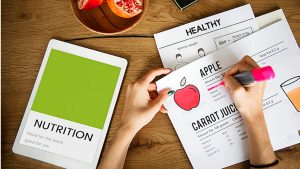
You can include calorie-dense foods like nuts, seeds, avocados, and nut butters in your diet to generate this calorie surplus. Healthy fats and protein, which are crucial for gaining muscle mass, are abundant in these foods. You can also raise your portion sizes or incorporate a snack into your day.
Little, calorie-dense snacks spread out throughout the day would likely be beneficial if you don’t have a big appetite. You might just raise the portion sizes of the meals you normally consume if you don’t have time to prepare additional snacks. Reaching for a container of salty chips or a tub of sweet ice cream may seem like a simple option because they are high in calories, but these foods are not very nutritious.
Recommended: How To Know A Girl Is A Player
Here are some energy-dense foods that may help you gain weight:
a. Carbohydrates: The body uses carbohydrates as a source of energy. Foods that are mostly composed of carbohydrates are frequently referred to as “carbs” by people.
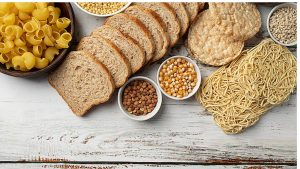
These foods could also have additional nutrients, though.
Rice: The carbohydrate content is high in rice. For instance, a serving of 100 grams of brown rice contains about 357 calories. Moreover, this variety of rice is rich in protein than some other varieties. White rice has a reduced protein level, but it can be served with other meals, like meat or beans, to increase the protein and calorie content of the meal.
Whole grain bread: In comparison to white bread, whole-grain bread has more protein and complex carbohydrates. By incorporating a protein-rich food, such as nut butter or avocado, into bread, people can enhance the number of calories it contains. They can also be used to make sandwiches with nutrient-dense components.
Whole grain cereals: Whole grain cereals include oats, wheat, barley, and rice. These whole grains are available for individual purchase, and customers can combine them at home to serve with milk or yoghurt. As an alternative, people can purchase cereal bars or pre-mixed cereals.
Some cereals may have additional vitamins and minerals incorporated by the manufacturers, but some of them also include a sizable quantity of sugar. It is therefore crucial to constantly read the label.
Dried fruits: Dried fruits possess fructose, a sugar found in fruits. Thus they are beneficial for boosting the caloric content of meals and as a natural sweetener. Raisins, dates, and prunes are some examples. Dates can be used to sweeten cereals or porridge. Dried apricots can be mixed with yoghurt or added to smoothies. Certain dried fruits go nicely with salads and with some prepared foods.
Dark chocolate: Cocoa beans, which have a lot of carbs, are used to make chocolate. Dark chocolate often has a higher cocoa content than milk chocolate and less sugar in general. Therefore, it contains more of the cocoa bean’s antioxidants.
Other sources of carbohydrates include potato, pasta, sweet potato, squash, and corn.
See Also: Solutions To Gender Discrimination & Inequality
b. Dairy: Many dairy products are calorie-dense, and they may also contain beneficial nutrients, such as protein and calcium.
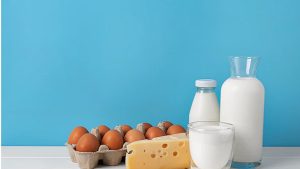
Milk: A calorie-dense food high in calcium, carbs, and protein is milk. There are roughly 122 calories in one cup of 2% fat milk. The protein in milk makes it a smart option for anyone looking to gain muscle mass, and the calcium makes it beneficial for those worried about osteoporosis or bone density.
Cheese: Another dairy food with a lot of calories is cheese. Calcium and protein are also present. The type of cheese and how it is made will determine the exact nutritional value.
Yoghurt: Yoghurt with added fat has plenty of calories and protein. Instead of flavoured yoghurts, which may be high in sugar, it is recommended to use plain or Greek yoghurt. Yoghurt can be organically flavoured by including honey, fruit, almonds, or unsweetened cocoa powder.
c. Fats and Oil: Fats and oil are a great complement to any diet for weight gain because of their high-calorie content.
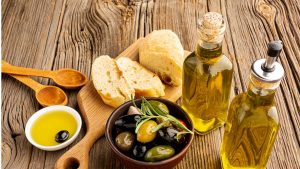
When taken in moderate quantities, unsaturated fat is advantageous to health as they help increase healthy cholesterol and lower one’s risk of heart disease.
Olive oil: Olive oil has a lot of calories and a lot of monounsaturated fats, a kind of unsaturated fat. It is crucial to consume olive oil in a balanced diet because it does include some saturated fat.
Nuts and seeds: A large number of nuts and seeds are calorie-dense sources of unsaturated fat. Again, because nuts and seeds can contain saturated fat as well, it is advisable to eat them in moderation. Walnuts, macadamia nuts, peanuts, and almonds are some examples.
Avocados: Unsaturated fat can be found naturally in avocados and avocado oil. Avocados in their whole form are also a good source of vitamins and minerals like magnesium, calcium and potassium.
By adding some avocado, one can dramatically up the calorie count of sandwiches, salads, and smoothies.
Recommended: Best Restaurants in Nigeria
Note: You may need to avoid the over-consumption of fruits and vegetables if you want to gain weight. The fibre in fruits and vegetables may help you feel full more quickly, leaving less room for energy-dense foods.
2. Eat More Protein: Gaining weight requires protein since it is necessary for the maintenance and growth of muscle tissue.
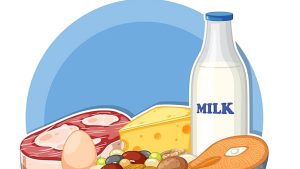
You can gain muscle mass quickly and effectively by eating a high-protein diet. The following foods are good sources of protein: meat, fish, eggs, dairy products, beans, lentils, and soy products. Per pound of body weight, try to eat at least 1 gram of protein daily.
Recommended: The Six Classes of Food Explained
3. Lift Weights: One of the best strategies for weight gain is strength training. You can add muscle mass and more weight to your body by lifting weights. Strength training also lowers the risk of developing chronic diseases, increases metabolism, and improves bone density, among other advantages.

The majority of your workouts should consist of compound movements like squats, deadlifts, bench presses, and rows. Exercises that simultaneously engage numerous different muscle groups are the best for building muscle mass.
4. Get Enough Sleep: Sleep is essential for muscle repair and development. Your body releases hormones during sleep that support muscle growth and repair. Also, obtaining adequate sleep can increase your energy level and motivation for healthy eating and activity.
Adults typically require 7-9 hours of sleep per night. Try creating a pleasant sleep environment, avoiding caffeine and alcohol before bed, and setting a nighttime routine if you’re having trouble getting enough sleep.
See Also: Best Places To Go On A Date
5. Stay Hydrated: To maintain general health while trying to gain weight, it’s especially important to drink adequate water. Since it aids in digestion and aids in the body’s absorption of nutrients from food, drinking water can boost your overall nutrient intake.

Strive to consume at least 8 to 10 glasses of water a day, and more if you exercise frequently. To enhance your overall fluid consumption, you can also ingest additional liquids like milk, juice, and smoothies.
5. Eat More Frequently: Eating more frequently can help you consume more calories throughout the day. Instead of three large meals, try eating six smaller meals or snacks throughout the day. This can help you avoid feeling too full or bloated, and can also help you maintain a steady stream of nutrients and energy throughout the day.

Try to eat every 2-3 hours, and focus on nutrient-dense foods like fruits. Avoid eating regimens like intermittent fasting, for example. This eating regimen may be beneficial for losing weight and for other reasons, but it may make it much more difficult to consume enough calories needed for weight gain.
Must Read: Differences Between Introverts And Extroverts
Closing Thoughts
To swiftly gain weight, it’s vital to get everything done correctly. Whilst consuming copious amounts of soda and doughnuts might make you gain weight, it can in the same vein also destroy your health. A combination of calorie-dense foods, resistance training, and healthy fats is required to gain weight rapidly and properly.
However, it’s important to consult a healthcare professional before embarking on any weight gain program to ensure that it is safe and sustainable in the long run.

Edeh Samuel Chukwuemeka, ACMC, is a lawyer and a certified mediator/conciliator in Nigeria. He is also a developer with knowledge in various programming languages. Samuel is determined to leverage his skills in technology, SEO, and legal practice to revolutionize the legal profession worldwide by creating web and mobile applications that simplify legal research. Sam is also passionate about educating and providing valuable information to people.